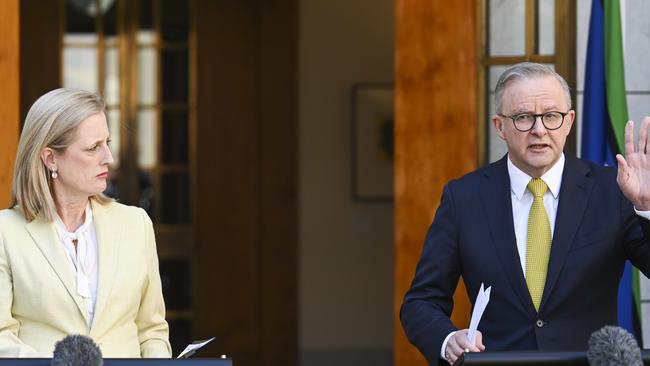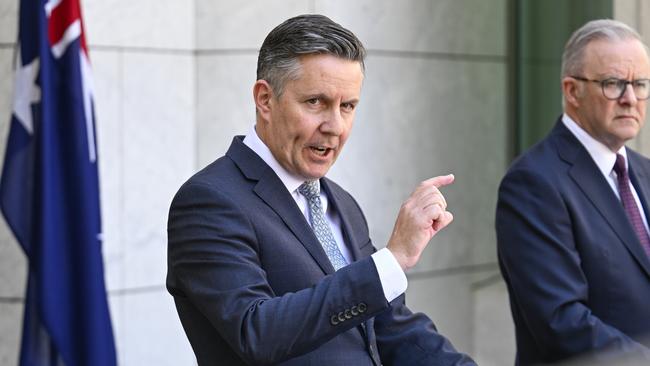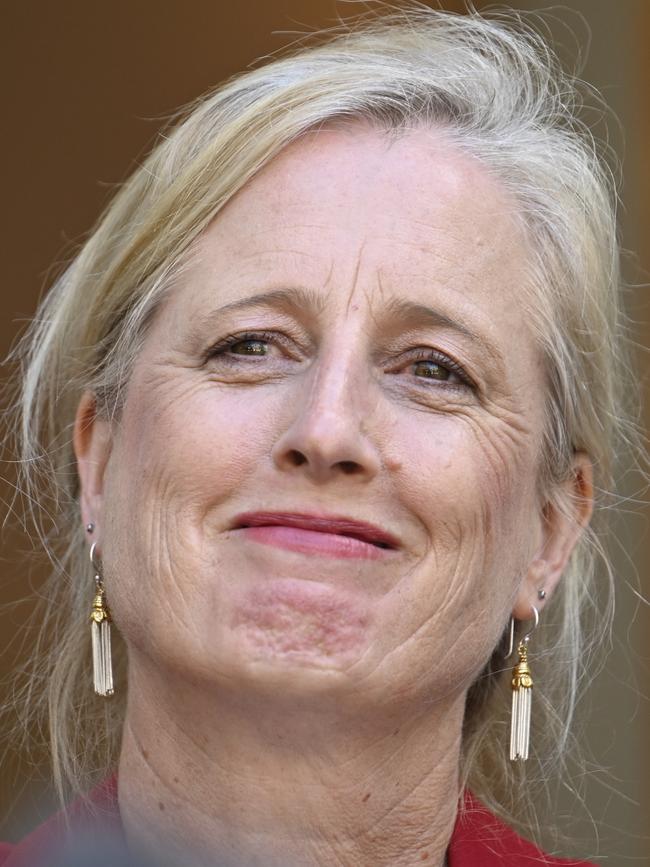Labor invests in female health, argues system ‘wasn’t working for women’
Improved access to birth control and treatments for UTIs, menopause and endometriosis will reform care for a health area ‘shrouded in shame and stigma’.

The Albanese government has pledged to spend more than half a billion dollars on women’s health programs, highlighting improved access to contraception and menopause care, with changes set to take effect on either side of the federal election.
Minister for Women Katy Gallagher, Health Minister Mark Butler and Assistant Health Minister Ged Kearney on Sunday revealed a $573 million suite of policies including new subsidies for some oral contraceptives, more endometriosis clinics, access to intra-uterine contraceptive devices and greater Medicare support for menopause treatments.
A portion of the announcements, namely newly subsidised medicines, will take effect next month, while longer term goals such as constructing endometriosis and pelvic pain clinics are commitments Labor will take to its second term if re-elected. A joint announcement said the health package was informed by recommendations from relevant senate inquiries and the National Women’s Health Advisory Council.

Mr Butler said the government’s independent medicine subsidy agency, the Pharmaceutical Benefits Scheme, had not kept pace with social progress in ensuring access to a multitude of contraceptives, while keeping hormone replacement therapies out of reach for many women.
“With no new contraceptive pill or menopausal hormone therapy added to the PBS in decades, it was clear the PBS wasn’t working for women,” he said. “That’s why I asked our medicines experts to find a way to right that wrong.
“It’s about time Australian women had more choice, lower costs and better health care
“Today’s announcement is a tribute to all the Australian women who have worked so hard, for so long, to have their voices heard and acknowledged.”
Two contraceptive pills, sold under the brand names Yaz and Yasmin, will be newly listed on the PBS from March. The Health Department estimates one in three Australian women pays for birth control outside of the PBS, citing a lack of new subsidies in more than 30 years.
It will cut annual prescription costs from $380 to $126.40, or $30.80 for concession card holders.
Also from March, three HRT types will be newly subsidised: Prometrium, Estrogel and Estrogel Pro.
While the Health Department frequently cites the independence of the PBS, it confirmed Mr Butler personally requested the Pharmaceutical Benefits Advisory Committee consider supporting HRT and contraceptive subsidies.
“Women have asked government to take their healthcare seriously, and we have listened,” Senator Gallagher said.
“Our investment of more than half a billion dollars will deliver more choice, lower costs, and better healthcare for women at all stages of their lives.
“These changes could save women and their families thousands of dollars across their lifetimes.
“Whether it’s saving hundreds of dollars on contraceptives, opening more endo and pelvic pain clinics, or ensuring more reliable support for women going through menopause – this comprehensive package will deliver for millions of women and their families.”


Complementing HRT access will be greater support for menopause health assessments under Medicare, along with a national awareness campaign, a doctor training drive and new clinical guidelines to unify care. The rebate would take effect from July.
In May last year, Mr Butler announced more than $100 million in endometriosis supports through Medicare, with a new set of endometriosis and pelvic pain clinics intended to build on this.
The construction of 11 new clinics will bring the national total to 33, while expanding their role to assist in specialised care for menopausal and perimenopausal women.
Finally, the health package included a boost to Medicare rebates for IUDs and two national trials to ramp up access to treatment for uncomplicated urinary tract infections.
Australia’s IUD uptake tracks below comparative countries, at around 10 per cent compared with 12.5 per cent in New Zealand and 33 per cent in Sweden. By raising the rebate by 150 per cent and investing in eight specialised training centres, Labor hopes to drive up use while improving supplementary health outcomes from implants like reductions to heavy menstrual bleeding, endometriosis and period pain.
UTI treatment trials will begin from early next year, allowing concession card holders to receive free pharmacy consultations.
“From our first periods as young girls to menopause in older age, women’s health has been shrouded in shame and stigma. I’m proud to be part of an Albanese Labor Government that stands up for women and says this is not good enough, and it never has been,” Ms Kearney said.
“Women deserve choice and control when it comes to their healthcare needs, and they deserve a healthcare system that understands and responds to these needs as they change throughout their lives.
“This investment in women’s health of over half a billion dollars will shift the dial on an entrenched culture of medical misogyny – we’re talking about alleviating pain, reducing delays in diagnosis, avoiding unplanned pregnancies, and transforming menopause care.”
Health policies have been a central pillar in the early days of the Albanese government’s second term election campaign, driving up its contrast with the opposition through a revived ‘Medicare’ tactic.
The Coalition immediately supported the $573m investment in women’s health, with Opposition legal affairs spokeswoman Michaelia Cash on Sunday saying the measures were “building on” the previous Coalition government’s actions. “We support the announcement and I really am pleased, though, that it is a building on of the work that we had done already as the previous Coalition government, but in particular we had established nationally those endometriosis-specific clinics,” she told Sky News.


To join the conversation, please log in. Don't have an account? Register
Join the conversation, you are commenting as Logout